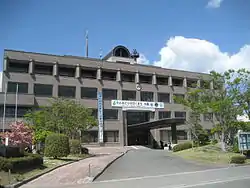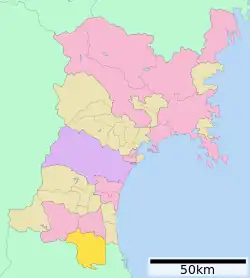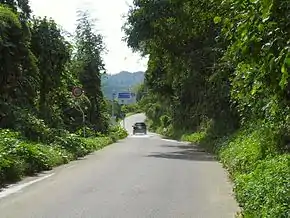Marumori, Miyagi
Marumori (丸森町, Marumori-machi) is a town located in Miyagi Prefecture, Japan. As of 1 June 2020, the town had an estimated population of 13,092, and a population density of 48 persons per km² in 5,050 households.[1] The total area of the town is 273.30 square kilometres (105.52 sq mi).
Marumori
丸森町 | |
|---|---|
 Marumori Town Office | |
 Flag  Seal | |
 Location of Marumori in Miyagi Prefecture | |
 Marumori | |
| Coordinates: 37°54′41.2″N 140°45′55.4″E | |
| Country | Japan |
| Region | Tōhoku |
| Prefecture | Miyagi |
| District | Igu |
| Area | |
| • Total | 273.30 km2 (105.52 sq mi) |
| Population (June 1, 2020) | |
| • Total | 13,092 |
| • Density | 48/km2 (120/sq mi) |
| Time zone | UTC+9 (Japan Standard Time) |
| Phone number | 0224-72-2111 |
| Address | 120 Torii, Marumori-machi, Igu-gun, Miyagi-ken 981-2192 |
| Climate | Cfa |
| Website | Official website |
| Symbols | |
| Bird | Japanese bush warbler |
| Flower | Lilium auratum |
| Tree | Cryptomeria |

Geography
Marumori is located in the extreme southern portion of Miyagi Prefecture in the Tōhoku region of northern Japan, bordered by Fukushima Prefecture to the south, east and west. The name “Marumori” means "circle forest" in Japanese and the town is located in a circular basin surrounded by heavily forested mountains. The Abukuma River passes through the town.
Neighboring municipalities
Miyagi Prefecture
Fukushima Prefecture
Climate
Marumori has a humid climate (Köppen climate classification Cfa) characterized by mild summers and cold winters. The average annual temperature in Marumori is 12.2 °C (54.0 °F). The average annual rainfall is 1,298.7 mm (51.13 in) with September as the wettest month. The temperatures are highest on average in August, at around 24.0 °C (75.2 °F), and lowest in January, at around 1.3 °C (34.3 °F).[2]
| Climate data for Marumori (1991−2020 normals, extremes 1977−present) | |||||||||||||
|---|---|---|---|---|---|---|---|---|---|---|---|---|---|
| Month | Jan | Feb | Mar | Apr | May | Jun | Jul | Aug | Sep | Oct | Nov | Dec | Year |
| Record high °C (°F) | 17.1 (62.8) |
21.3 (70.3) |
25.5 (77.9) |
31.8 (89.2) |
34.2 (93.6) |
35.6 (96.1) |
37.6 (99.7) |
37.2 (99.0) |
35.6 (96.1) |
30.8 (87.4) |
26.3 (79.3) |
20.8 (69.4) |
37.6 (99.7) |
| Average high °C (°F) | 6.0 (42.8) |
6.9 (44.4) |
10.6 (51.1) |
16.4 (61.5) |
21.2 (70.2) |
23.8 (74.8) |
27.1 (80.8) |
28.6 (83.5) |
25.1 (77.2) |
20.0 (68.0) |
14.5 (58.1) |
8.8 (47.8) |
17.4 (63.4) |
| Daily mean °C (°F) | 1.3 (34.3) |
1.8 (35.2) |
4.9 (40.8) |
10.3 (50.5) |
15.7 (60.3) |
19.2 (66.6) |
22.8 (73.0) |
24.0 (75.2) |
20.3 (68.5) |
14.4 (57.9) |
8.4 (47.1) |
3.6 (38.5) |
12.2 (54.0) |
| Average low °C (°F) | −3.7 (25.3) |
−3.4 (25.9) |
−1.0 (30.2) |
3.7 (38.7) |
10.2 (50.4) |
15.2 (59.4) |
19.3 (66.7) |
20.3 (68.5) |
16.2 (61.2) |
9.2 (48.6) |
2.6 (36.7) |
−1.5 (29.3) |
7.3 (45.1) |
| Record low °C (°F) | −15.7 (3.7) |
−16.7 (1.9) |
−13.3 (8.1) |
−7.5 (18.5) |
−0.1 (31.8) |
6.0 (42.8) |
10.8 (51.4) |
11.1 (52.0) |
4.3 (39.7) |
−2.5 (27.5) |
−5.7 (21.7) |
−12.8 (9.0) |
−16.7 (1.9) |
| Average precipitation mm (inches) | 52.9 (2.08) |
35.8 (1.41) |
73.7 (2.90) |
90.9 (3.58) |
99.9 (3.93) |
126.8 (4.99) |
176.0 (6.93) |
169.0 (6.65) |
210.0 (8.27) |
168.0 (6.61) |
57.6 (2.27) |
38.9 (1.53) |
1,298.7 (51.13) |
| Average precipitation days (≥ 1.0 mm) | 6.0 | 5.1 | 8.0 | 8.0 | 9.4 | 11.7 | 14.2 | 12.3 | 12.3 | 9.1 | 5.8 | 6.1 | 108 |
| Mean monthly sunshine hours | 168.1 | 165.4 | 187.2 | 190.7 | 193.3 | 142.2 | 130.4 | 152.5 | 125.9 | 143.0 | 148.7 | 154.6 | 1,901.2 |
| Source: Japan Meteorological Agency[3][2] | |||||||||||||
Demographics
Per Japanese census data,[4] the population of Marumori has declined over the past 70 years.
| Year | Pop. | ±% |
|---|---|---|
| 1920 | 22,803 | — |
| 1930 | 24,121 | +5.8% |
| 1940 | 24,449 | +1.4% |
| 1950 | 29,898 | +22.3% |
| 1960 | 26,740 | −10.6% |
| 1970 | 22,027 | −17.6% |
| 1980 | 20,849 | −5.3% |
| 1990 | 19,755 | −5.2% |
| 2000 | 17,868 | −9.6% |
| 2010 | 15,501 | −13.2% |
| 2020 | 12,262 | −20.9% |
History
The area of present-day Marumori was part of ancient Mutsu Province and was part of the holdings of Sendai Domain under the Edo period Tokugawa shogunate. The village of Marumori was established on April 1, 1889, with the establishment of the post-Meiji restoration modern municipalities system. It was raised to town status on December 1, 1954, after merging with the neighboring villages of Kaneyama, Ōuchi, Ōhari, Kōya, Kosai, Tateyama and Hippo.
Government
Marumori has a mayor-council form of government with a directly elected mayor and a unicameral town council of 14 members. Marumori, together with the city of Kakuda, contributes one seat to the Miyagi Prefectural legislature. In terms of national politics, the town is part of Miyagi 3rd district of the lower house of the Diet of Japan.
Economy
The economy of Marumori is largely based on agriculture and forestry.
Education
As of April 2022, Marumori has two public elementary schools and one public junior high school operated by the town government, and one public high school operated by the Miyagi Prefectural Board of Education. There is also one private elementary school.
Transportation
Highway
Sister city relations
 USA - Hemet, California, USA
USA - Hemet, California, USA Japan - Kitami, Hokkaido, Japan
Japan - Kitami, Hokkaido, Japan
References
- Marumori town official statistics (in Japanese)
- 気象庁 / 平年値(年・月ごとの値). JMA. Retrieved March 23, 2022.
- 観測史上1~10位の値(年間を通じての値). JMA. Retrieved March 23, 2022.
- Marumori population statistics
External links
![]() Media related to Marumori, Miyagi at Wikimedia Commons
Media related to Marumori, Miyagi at Wikimedia Commons
- Official Website (in Japanese)